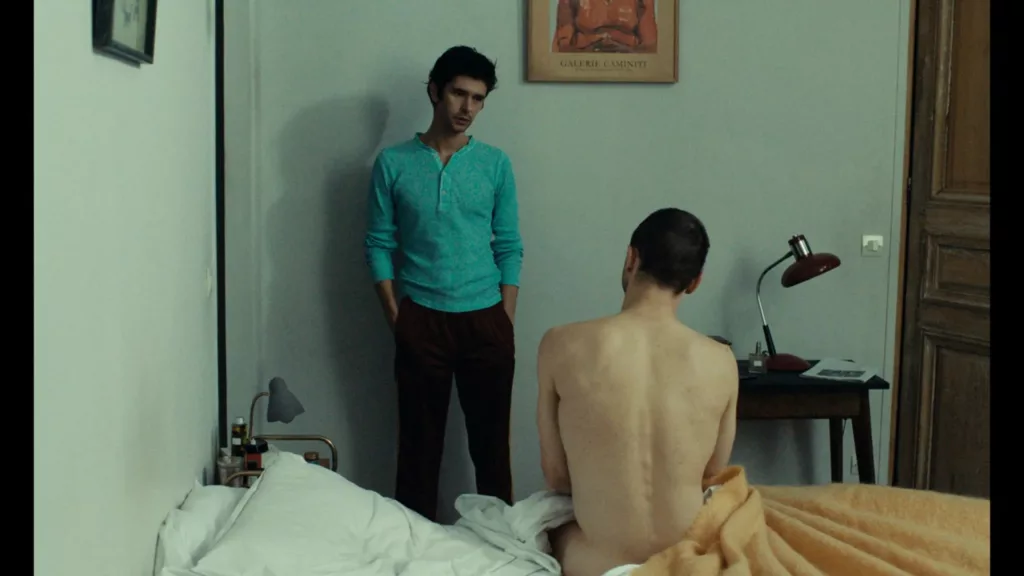Acclaimed indie director Ira Sachs returns with his latest relationship drama Passages, a film already sparking controversy due to its unflinching sexuality earning it a rare NC-17 rating. Sachs is known for making intimate relationship stories filled with nuance, including films like Keep the Lights On and Love is Strange. With Passages, he once again delivers a bold, provocative look at modern love and sexuality.
The film revolves around Tomas, a narcissistic film director living in Paris, his husband Martin, and his new mistress Agathe. This trio forms a distorted love triangle as Tomas bounces back and forth between the two, unable to fully commit to either. His reckless behavior wreaks havoc on Martin and Agathe’s lives, forcing them to come to terms with Tomas’ damaging actions.
Passages made waves with its NC-17 rating, which limits the audiences that can view it in theaters. The rating stems from Sachs’ unflinching, raw portrayal of sexuality throughout the film. Rather than shying away from sex, he uses it to explore the complex motivations and transitions happening between the three central characters. This honest depiction of physical intimacy generated controversy, but it also gives the film an electric, provocative edge.
With assured direction and magnetic lead performances, Passages looks to be another perceptive relationship study from Sachs. It provides an intimate glimpse into the tangled Web of affairs, heartbreak, and unbridled human desire.
“Uncover the Truth Behind Andrew Tate”: Intrigued by the controversial figure of Andrew Tate? Read our ‘I Am Andrew Tate Review’ for an in-depth analysis of his rise and the societal implications.
The Toxic Charisma of Tomas
At the center of Passages is Franz Rogowski’s mesmerizing performance as Tomas, the narcissistic and manipulative film director who wreaks havoc on the lives of those around him. Rogowski has an uncanny ability to make Tomas oddly magnetic, despite his serious flaws. We can’t take our eyes off him even as we watch him deceive and damage those he claims to care for.
Tomas is first introduced on the set of his latest film, already irritated and impatient with an actor who can’t seem to follow his vague instructions. This small scene establishes Tomas’ self-centered nature—he assumes everyone should intuitively understand and perfectly execute his artistic vision. He doesn’t tolerate failure or imperfection.
This same self-absorption extends to his personal life. Though married to Martin, as soon as Tomas wraps shooting he feels compelled to have an affair with Agathe, a young schoolteacher. He callously announces this transgression to Martin the next morning, unable to comprehend why his husband isn’t enthusiastically supportive. In Tomas’ mind, his desires eclipse all else.
What makes Tomas intriguing despite his obvious flaws is his undeniable magnetism. Rogowski instills him with a restless charisma and intelligence that draws people in, even as he tramples over their feelings. Both Martin and Agathe know Tomas is hurting them, yet they can’t seem to quit him. Rogowski makes you understand why they keep coming back for more.
In one scene, Tomas shows up uninvited at Martin’s new apartment singing a haunting love song while staring longingly at his ex-husband. Rogowski fills the moment with such aching sadness that you temporarily forget what a jerk Tomas has been. This magnetic vulnerability makes his bad behavior somehow forgivable.
Of course, Tomas inevitably lets Martin and Agathe down again and again. He lies about seeing Agathe, then leaves her completely once they hit a rocky patch. With Martin, Tomas says one thing but does another. “You’re my brother, Martin!” he exclaims disingenuously after being caught in an obvious lie.
Rogowski needs barely a facial expression to convey the manipulation and insincerity lurking within Tomas. He’s an emotional vampire who drains those around him all while pretending to love them deeply.
By the end of the film, Rogowski has turned Tomas into a complex, frustrating, yet somehow pitiable character. He’s not someone you can admire, yet there is something broken and human about him—a bottomless need for validation and attention that prevents him from truly connecting to others. It’s a razor-sharp portrayal of a toxic narcissist that lingers in your mind long after the credits roll.
The Collateral Damage of Tomas’ Chaos
While Tomas may be the unpredictable spark that ignites Passages, the film would not work without the grounded, emotionally intuitive performances of Ben Whishaw as Martin and Adèle Exarchopoulos as Agathe. These two characters represent the collateral damage left in the wake of Tomas’ chaotic affairs and wavering commitment. Both Whishaw and Exarchopoulos shine in roles that require them to convey hurt, growth, and a maturity that Tomas lacks.
As Martin, Whishaw turns in a subtle, melancholy performance as Tomas’ spurned husband. Though Martin is soft-spoken and introverted compared to the brash Tomas, Whishaw gives him a steadfast dignity in the face of heartbreak. When Tomas first announces he’s slept with Agathe, Martin maintains his composure even while his face betrays profound shock and disappointment.
Later, when Tomas wants praise for his new relationship with Agathe, Martin responds with one of the film’s most resonant lines: “You can pursue anything you want, but you can’t dictate how I feel.” Whishaw delivers this with a restrained power that reveals the depth of Martin’s hurt, while also establishing his self-worth. He refuses to coddle Tomas’ ego any longer.
Gradually Martin realizes he must move on, and he begins a new relationship with Amad, a calmer and more responsible man. This incenses the jealous Tomas, who tries to worm his way back into Martin’s life. Whishaw makes it clear this causes Martin ongoing anguish, as he still harbors love for Tomas despite recognizing his toxicity. Their shared history cannot be easily severed.
Meanwhile, Exarchopoulos endows the young Agathe with a vitality and maturity beyond her years. When we first meet Agathe, she seems to be living carefreely, recently out of a relationship and ready for fun. But her dynamic with Tomas forces her to grow up fast as she realizes the affair has serious consequences, including an unplanned pregnancy.
Exarchopoulos balances Agathe’s youthful exuberance with moments of deeply affecting insight, especially as she awakens to Tomas’ manipulations. Her weary sadness as Tomas yet again puts Martin first is palpable. Like Martin, Agathe must confront how Tomas’ inconstancy has shattered her faith in him.
Yet Exarchopoulos still makes Agathe’s attraction to Tomas believable thanks to her luminous screen presence. She has an easy sensuality and sly humor that draws the viewer in, just as Tomas is drawn in. We come to care deeply about Agathe’s journey and heartache thanks to Exarchopoulos’ poignant performance.
Together, Whishaw and Exarchopoulos take roles that could have been one-note and give them compelling emotional depth and humanity. Their characters represent the two poles of Tomas’ life, forever oscillating between them as they try to salvage their own happiness. Their eventual resolve and self-realization form the most moving parts of Passages.
Uncover the Dark Satire of Saltburn: Delve into Emerald Fennell’s latest film, a provocative exploration of class, privilege, and toxic relationships. Our in-depth review of Saltburn offers a critical look at this gripping social satire set against a backdrop of aristocratic opulence.
Sexuality as Storytelling
One of the most discussed elements of Passages is the film’s unflinching and raw portrayal of sexuality, which garnered it the controversial NC-17 rating. Rather than shying away from sex, Ira Sachs leans into it as a vital part of understanding his characters and their convoluted relationships. The sex in Passages is not gratuitous, but purposeful.
The passion-filled sex scene between Tomas and Agathe immediately establishes the combustible heat between them, a fire that burns Martin when Tomas confesses. A later scene between Tomas and Martin stands out for its striking intimacy and beauty. The camera lingers on their intertwined bodies, focusing not on titillation but on the partners’ deep knowledge of one another. It wordlessly reveals the complex bonds of their marriage that Tomas threatens to destroy with his affairs.
When Tomas and Agathe’s ardency cools, their sex becomes perfunctory and distant. Meanwhile, Martin’s new relationship with Amad is portrayed through energetic, joyful sex, underscoring how he has moved on to a more fulfilling partnership. In this way, the sex always serves a narrative purpose, driving home where the characters stand emotionally.
The most controversial scene is the attempted three-way between Tomas, Martin and Agathe. It feels less like genuine connection than like Tomas orchestrating a fantasy. The raw awkwardness and discomfort of the encounter highlights how broken these relationships have become.
Ultimately, Sachs uses sex as a storytelling device, finding truth and meaning in the intimate moments. The sex reveals truths the characters are sometimes unable to verbalize, acting as a window into their fractured hearts and minds.
While the NC-17 rating has generated buzz, it’s unfortunate that it may prevent the film from being seen by wider audiences who could appreciate Sachs’ thoughtful approach. The sex scenes provoke not for provocation’s sake, but to deepen our understanding. They add to the film’s authenticity rather than detract from it.
Overall Passages makes the case for sexuality as an essential part of exploring human relationships. It portrays sex with sobriety and contemplation, not shying away from the joys, responsibilities, and consequences. The result is a raw, messy, but utterly compelling portrait of passion’s winding path and the damage left when it’s pursued recklessly or dishonestly. Passages leaves viewers pondering not just the heat of sex, but the reverberations felt long after.
Uncover the Dark Truth of Ervil LeBaron’s Cult: Delve into the harrowing experiences of the children who survived Ervil LeBaron’s reign. Read our in-depth review of Daughters of the Cult for a deep dive into this chilling docuseries.
Sachs’ Thoughtful, Unflinching Lens
Helming Passages, indie darling Ira Sachs brings his characteristic subtlety and eloquent visual style to a morally complex tale. Sachs has a talent for zeroing in on intimate relationship dynamics and extracting the quiet drama of daily life.
With assured direction, he follows three individuals entwined in a distorted love triangle, painting an empathetic portrait of the confusion and unsettling transitions that accompany an affair.
Rather than staged histrionics, Sachs opts for a fly-on-the-wall approach. The camera lingers patiently on nuanced interactions, such as when Agathe realizes Tomas has again chosen Martin over her. With just a slight narrowing of her eyes and a deep exhale, her sadness sinks in.
Sachs’ realistic slice-of-life style relies on the strength of the lead performances, and actors like Franz Rogowski thrive within his long, unbroken takes. Minor gestures and glances speak volumes.
Visually, Passages demonstrates Sachs’ compositional brilliance. He uses precise framing to reinforce themes and relationships, such as positioning Martin and Tomas with Martin centralized in the frame. This reflects Tomas’ control over their relationship, obscuring Martin physically just as he does emotionally.
By avoiding exaggeration, Sachs makes the tumultuous affair feel like an intimate glimpse at three individuals stumbling through profound life changes. He neither satirizes nor sensationalizes, instead treating his characters with great empathy. We come to understand, if not condone, how even level-headed people like Martin and Agathe can be drawn into Tomas’ storm.
With his sixth feature film, Sachs again proves his ability to craft thoughtful relationship dramas. Passages delivers an unvarnished look at the complexity of affairs, resisting easy judgments. Through his lens, we achieve a deeper understanding of the unpredictability of love itself.
An Unflinching Portrait of Love’s Fallout
With his intimate yet sprawling relationship drama Passages, Ira Sachs once again proves himself one of our most insightful chroniclers of modern love. Unafraid of moral ambiguity, Sachs explores the damage that results when passion curdles into deceit and inconstancy.
Centered on Franz Rogowski’s mercurially toxic yet magnetic performance as Tomas, the film digs deep into the psyche of a charming narcissist unable to reconcile his needs with others’. Both Ben Whishaw as Martin and Adèle Exarchopoulos as Agathe turn in beautifully modulated performances as the collateral damage of Tomas’ chaotic affairs.
Though difficult to embrace as a protagonist, Tomas is pathology made captivatingly human through Rogowski’s portrayal. We come to understand, if not admire, his restless longing for validation. Similarly, Sachs extends empathy towards Martin and Agathe rather than framing them as blameless victims. Their choices are rendered with nuance.
With intimate sexuality and striking compositions, Passages creates an authentic world tinged by sadness and disruption. Sachs’ ability to find the poignancy in flawed people shows maturity as a filmmaker. He is not afraid to sit with the uncomfortable.
Passages lingers because it feels true to life. Sachs elevates a story of petty betrayals into a meditation on the unpredictability of desire and the ripples caused by self-absorption. Few films have so candidly explored the darker recesses of indecisive passion. Captivating yet chastening, Passages discovers profundity in one fractured triangle’s search for love and meaning.
“Delve into the complex dynamics of old friendships and faltering marriages in our review of Matt and Mara. This indie gem offers a slice of life that’s as messy as it is mesmerizing, anchored by stellar performances and nuanced storytelling.”
The Review
Passages
With magnetic performances and thoughtful direction, Passages earns its provocative NC-17 rating through raw authenticity rather than exploitation. Ira Sachs once again proves himself a master at untangling the nuances of modern relationships. The film resonates thanks to its moral complexity and empathy for flawed characters. Led by Franz Rogowski's riveting and toxic performance as Tomas, Passages provides an intimate look at the fallout from dishonest desire. Though unflinching in its darkness, the film ultimately argues for the resilient endurance of love. Passages may disturb, but it also rewards with hard-earned insights.
PROS
- Magnetic lead performance by Franz Rogowski as the narcissistic and manipulative Tomas
- Strong supporting performances by Ben Whishaw and Adèle Exarchopoulos as the wounded parties in Tomas' love triangle
- Ira Sachs' thoughtful direction and intimate visual style
- Convincing portrayal of complex modern relationships and sexuality
- Nuanced exploration of the damage caused by toxic behavior
- Lack of judgment towards flawed characters creates empathy
CONS
- The unlikable protagonist Tomas may frustrate some viewers
- Secondary characters Martin and Agathe feel underdeveloped at times
- The film's depressing subject matter may not appeal to all
- The short runtime results in some abbreviated storytelling



























































Discussion about this post